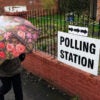The Israeli government, and Republicans in Congress, have expressed outrage over the Obama administration’s decision to allow adoption of a United Nations Security Council resolution that condemns Israel’s settlement construction.
These critics are portraying the U.S. move to abstain from the vote on Israel’s settlement activity—rather than using its veto power—as a last symbolic blow from outgoing President Barack Obama to Israeli Prime Minister Benjamin Netanyahu.
They also depict it as a break from the American precedent of shielding its longtime ally from action at the United Nations.
But other American administrations regularly have abstained or supported U.N. resolutions critical of Israeli policy.
Indeed, until this latest resolution adopted Friday, Obama had been the only president not to let a resolution critical of Israeli policy be adopted by in the Security Council.
“Virtually every U.S. administration in the last 30 to 40 years has allowed a resolution critical of Israel, particularly of settlements, to pass through abstention,” Jeremy Pressman, a University of Connecticut professor who studies the Palestinian-Israeli conflict, said in an interview with The Daily Signal.
United Nations Secretary-General Ban Ki-moon has said the U.N. has a “disproportionate” volume of resolutions against Israel, which he believes has “foiled the ability of the U.N. to fulfill its role effectively.”
According to research compiled by Seth J. Frantzman, the op-ed editor for The Jerusalem Post, 226 U.N. Security Council resolutions relating to Israel have surfaced since 1948.
Americans for Peace Now, which advocates a two-state solution to the Israeli-Palestinian conflict, found that during Lyndon B. Johnson’s presidency, the Security Council adopted at least seven resolutions critical of Israel—with the U.S. allowing the measures to be adopted either by abstaining or voting for them.
During Richard M. Nixon’s presidency, there were at least 15 such resolutions, Americans for Peace Now reported. The number peaked at 21 under President Ronald Reagan, when the United States voted in 1981 to condemn Israel’s air attack on an Iraqi nuclear reactor.
In 1987, meanwhile, the Reagan administration abstained and allowed adoption of a resolution that condemned Israel for killing Palestinian students and included Jerusalem as part of the “Palestinian and Arab Territories, occupied by Israel since 1967.”
Under President George W. Bush, the U.S. in 2003 voted for a resolution endorsing the Roadmap for Peace—an attempt to resolve the Israeli-Palestinian conflict—that called for a freeze of Israel’s settlement activity in the West Bank and Gaza Strip, and for Palestinian leaders to curb terrorism.
Pressman says the strong reaction to the Obama administration’s abstaining vote in the Security Council likely had to do with its timing—just before the inauguration of Donald Trump, who has vowed a different approach to Israel.
“On the one hand, we have seen this kind of resolution before—but not in the context of eight years of bad relations by a U.S. president and Israeli prime minister, as we’ve seen with Obama and Netanyahu,” Pressman said. “So there’s a confluence of factors that takes something that has happened before and turns it to a high-level confrontation.”
In addition, the resolution goes further than more recent Security Council resolutions because it is not limited to settlements in the West Bank. The Security Council also considers East Jerusalem as occupied territory, and that Israeli settlements there have “no legal validity.” According to Bloomberg, before Friday’s resolution, the last U.S. president who allowed the Security Council to declare that all of East Jerusalem was occupied territory was Jimmy Carter in 1980.
The resolution explicitly targets Israeli settlement construction as a barrier to peace, and includes only a vague condemnation of “all acts of violence against civilians, including acts of terror, as well as all acts of provocation, incitement, and destruction.”
“I don’t think there will ever be a perfect U.N. resolution,” said Richard LeBaron, a senior fellow at the Atlantic Council and former deputy chief of mission at the U.S. Embassy in Israel.
“The Palestinians benefit from being the minority party in the situation and having more sympathy among U.N. nations,” LeBaron told The Daily Signal in an interview, adding:
On the other hand, the substance of the resolution should not be that surprising to the Israelis. They know the U.S. considers these settlements to be illegal and everyone in the international community sees them as illegal.
Trump, in a Twitter post Friday, hinted at broader frustrations with the United Nations.
“As to the U.N., things will be different after Jan. 20th,” Trump wrote.
Netanyahu was also quick to criticize United Nations scrutiny of Israel, especially as other, more pressing challenges in the Middle East such as the war in Syria continue to defy solutions.
“Israel rejects this shameful anti-Israel resolution at the U.N. and will not abide by its terms,” Netanyahu said in a formal statement. “At a time when the Security Council does nothing to stop the slaughter of half a million people in Syria, it disgracefully gangs up on the one true democracy in the Middle East, Israel, and calls the Western Wall ‘occupied territory.’”
Undeterred by the stance of the Security Council, Israel’s government later said it would move ahead with building thousands of new homes in East Jerusalem.
Netanyahu also has curbed diplomatic contacts with Security Council countries, recalled envoys, and cut off aid to the United Nations. And Israeli officials have alleged that the U.S. orchestrated the U.N. vote. The Obama administration denied that claim.
Sen. Lindsey Graham, R-S.C., has threatened to cut American funding to the United Nations over the resolution.
Despite the United Nations’ longstanding focus on Israel, and its most recent statement on settlements, LeBaron does not expect the international body to become the primary facilitator in peace negotiations.
“I don’t think this particular resolution indicates a policy decision by the Obama administration that the U.N. is a good instrument through which to pursue negotiations,” LeBaron said, adding:
I don’t think there is a useful role for the U.N. There is a built-in bias, and if anything, this weakens their hand. More generally, this resolution won’t have any impact on the future of negotiations. There is a new U.S. administration coming in. It’s a new game now.
Pressman agreed that because the resolution on Israeli settlements is nonbinding, it will have no immediate tangible effect on the Israeli-Palestinian conflict, or the peace process—just like previous statements by the United Nations haven’t.
“It’s hard for me to think of a moment in the past 25 years when a U.S. resolution criticizing Israeli settlements has been decisive in U.S.-Palestinian negotiations,” Pressman said. “I have a hard time seeing this as some kind of decisive marker.”
































